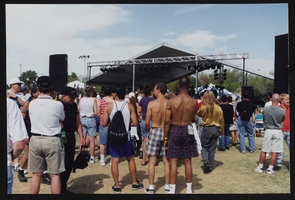Search the Special Collections and Archives Portal
Search Results
Dewey E. Freeman oral history interview
Identifier
Abstract
Oral history interview with Dewey E. Freeman conducted by Christine Kurdriel on March 14, 1981 for the Ralph Roske Oral History Project on Early Las Vegas. Freeman discusses his history with Southern Nevada including Las Vegas, Paradise Valley, and Blue Diamond.
Archival Collection
Lin Hansen oral history interview
Identifier
Abstract
Oral history interview with Ellen L. (Lin) Hansen conducted by Terri Hansen on April 30, 1985 for the Ralph Roske Oral History Project on Early Las Vegas. In her interview Hansen discusses the effects of World War II, family history, environmental changes, and government in Las Vegas, Nevada.
Archival Collection
Elizabeth Kelly oral history interview
Identifier
Abstract
Oral history interview with Elizabeth Kelly conducted by Jeff DeLoca on April 02, 1976 for the Ralph Roske Oral History Project on Early Las Vegas. Kelly discusses arriving to Southern Nevada from Scotland in the 1920’s. Kelly also talks about early life in Las Vegas, Nevada and the growth of the city.
Archival Collection
The Brodeur/Martin Company: "A Community Action Plan for Red Lion," a project in Reno, NV, 1983 September 22
Level of Description
Archival Collection
Collection Name: Gary W. Royer Collection on Gaming
Box/Folder: Box 047 (Restrictions apply)
Archival Component
George E. Franklin oral history interview
Identifier
Abstract
Oral history interview with George E. Franklin conducted by Linda Arnone on March 09, 1981 for the Ralph Roske Oral History Project on Early Las Vegas. Franklin discusses his career as an early Las Vegas, Nevada lawyer.
Archival Collection
Mike Gausling oral history interview
Identifier
Abstract
Oral history interview with Mike Gausling conducted by David G. Schwartz on December 7, 2016 for the Slot Operations Oral History Project. In his interview Gausling discusses his forty years in the casino industry. He talks about the positives and negatives in the field of slot management and the differences between local and Strip casino properties.
Archival Collection
Bernada French oral history interview
Identifier
Abstract
Oral history interview with Bernada French conducted by James Doohan on March 16, 1977 for the Ralph Roske Oral History Project on Early Las Vegas. French discusses her career in geology and railroads in Southern Nevada.
Archival Collection
Robert H. Lias oral history interview
Identifier
Abstract
Oral history interview with Robert H. Lias conducted by Verna M. Holley on March 02, 1976 for the Ralph Roske Oral History Project on Early Las Vegas. In this interview, Lias describes life in early Las Vegas, Nevada after arriving in 1932, and his career as a postmaster.
Archival Collection

Crowd watching performaces at Gay Pride, image 004: photographic print
Date
Archival Collection
Description
Gay Pride 1999 at Sunset Park; Photographer: Dennis McBride. (5-8-99)
Image
Hattie Robertson oral history interview
Identifier
Abstract
Oral history interview with Hattie Robertson conducted by Henry Thorns on March 05, 1980 for the Ralph Roske Oral History Project on Early Las Vegas. In this interview, Robertson discusses moving to Las Vegas, Nevada in 1969. Robertson also discusses her family life.
Archival Collection
